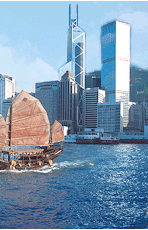Just what Shenzhen needs, a new office tower.
"blackmail and extort" Seems to me more like he is taking advantage of his position.
If the other 389 get less than he does, tough luck.
If there are no rules against what he is doing, then its OK.
Hotels and airlines put their fares up in high season. Is that fair on the customer?
Posted by Joel at April 14, 2007 11:32 PM
There's a key difference here between this nail house and hotels putting up fairs during high season: for hotels, it's all laid on the table in a take-it-or-leave deal...and if you decline, someone else will likely take your place. In the housing case, the developer already owns all 389 other lots, and those 389 people have already agreed to the compensation level.
To give you an analogy, in share market takeovers there is usually a compulsary aquisition trigger. If more than 90% of shares are tendered to the offer, the aquirer can compulsarily aquire the rest, because otherwise a lone hold-out can hold the aquirer to ransom. This is exactly the same thing.
Posted by Simon at April 16, 2007 09:14 AM
So the system in place is "poorly designed" and the hold outs are taking advantage of the "poorly designed" system. ("poorly designed" that is if you want to make it easier for forced buyouts, which seems pretty anti-free market to me)
And if you play the game poorly enough that you get caught in a PR Spin trap (like photos of nail houses), then don't you deserve to get taken to the cleaners?
Posted by Tom - Daai Tou Laam at April 16, 2007 02:12 PM
"But where does this leave the other 389 landholders who accepted the first, lower offer?"
In the exact same place they are right now, which is the exact same place they'll be if the holdout gets a higher offer, accepts the current offer, or is forcibly evicted by the government. How is it relevant?
"Many capitalist countries have a concept of eminent domain, where the state has the power to force property owners to sell without their consent, albeit in return for just compensation."
My definition of "just compensation" is one that doesn't require the long arm of the law to force me to comply.
From the eminent domain article you linked: "The property is taken either for government use or by delegation to third parties who will devote it to 'public uses.' The most common uses of property taken by eminent domain are public utilities, highways, and railroads." That is a vastly different concept than your stated purposes of opening restaurants and office buildings.
And yes, capitalist countries have eminent domain, but when used for abuses there is huge public outcry. In the U.S., the Kelo vs. New London decision upheld broad eminent domain use, but to public backlash, and the creation of legislation to prevent its excessive use.
Posted by Joe R. at April 16, 2007 02:37 PM
Joe:
The 389 others are relevant because they were all in the same situation as this hold-out, and accepted the compensation on offer. You can think of it like this: 389 people voted that this offer was fair, and one didn't. However unlike a democracy, this one has an effective veto over the whole project.
As for your second point, Kelo is a perfect demonstration that eminent domain is often used for a broadly defined "public use", for example by taking run-down buildings and allowing new office towers to be built on them because they will lead to greater tax revenues and better use of the space. Sure there was a huge outcry over Kelo, but the US Spremem Court decided that eminent domain is a broad power, unless circumscribed by legislation. After all the Supreme Court is the "check and balance" of excessiveness in the US system and they saw this example was a legitimate use of the power.
So my point remains: this hold-out is basiaclly extorting and blackmailing. No-one has disagreed with that point yet.
Tom:
It seems you've now become the arch-capitalist! These hold-outs play the PR game well, and in free-wheeling China they are proving better and more able at extracting money developers. "Forced buyouts" are not anti-free market, as the example in share aquisitions I gave above makes clear. They are a way of preventing a tiny minority from having a veto.
Posted by Simon at April 16, 2007 06:01 PM
Excuse me people, just wondering if anyone has heard of this software which is available at motounlockuk.co.uk.
Apparently you can unlock Motorola mobile phones simply using the IMEI number, cutting out the need for a USB cable to link your phone to your PC. Just used it with my razr v3 and a rokr e1, and it certainly works, but what do i do now with an unlocked phone?
It's for sale at 5 Pounds (UK), and i was wondering whether anyone had used it before. Sorry if i've posted in the wrong section!. Please Help!!
Posted by bigbonesandlegs at May 2, 2007 06:46 AM
« hide
comments
I usually go in with night-vision goggles, a vest and some canned food.
No need for tour guides.
Posted by doug at April 3, 2007 12:48 PM
I've been to, or passed through Lijiang four times. You really don't need a guide. A Lonely Planet Guidebook is enough.
There are plenty of guesthouses in the old city itself and flashier hotels in the new town.
It's very touristy and artificial, but a good base to see some "real" villages nearby.
Posted by john H. at April 3, 2007 05:09 PM
But John, then I might miss my chance to buy "antiques" or "Chinese crafts".
Posted by Simon at April 3, 2007 05:54 PM
« hide
comments









